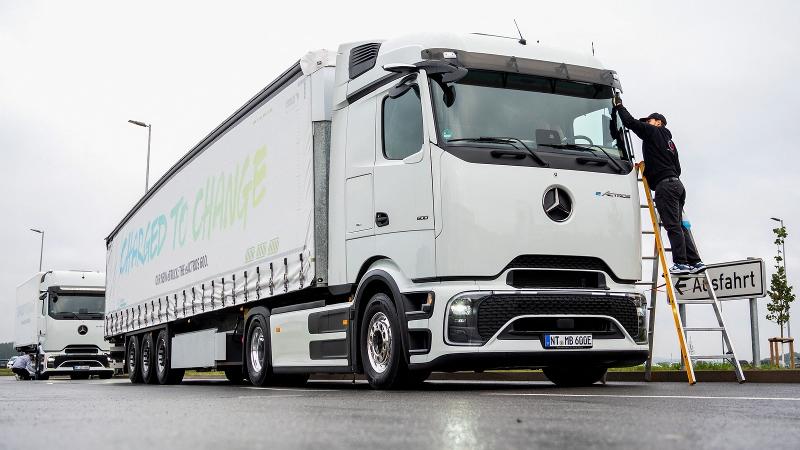Mercedes-Benz Trucks has taken a bold step in the race to decarbonize road logistics by unveiling the eActros 600, a heavy-duty electric truck designed to rival Tesla's Semi. With impressive features such as a 500-kilometer range and rapid charging capabilities, this truck is set to transform the industry.
The eActros 600: A Game-Changing Electric Truck
Discover the revolutionary features of the eActros 600 and how it aims to challenge Tesla's Semi.
Mercedes-Benz Trucks has introduced the eActros 600, a heavy-duty electric truck that is set to shake up the industry. With a range of 500 kilometers and the ability to haul up to 22 tons in cargo, this truck is a formidable competitor to Tesla's Semi.
One of the standout features of the eActros 600 is its rapid charging capability. In just 30 minutes, the battery can recharge from 20% to 80%, making it incredibly convenient for long-haul journeys. This is made possible by a one megawatt charging device, which provides the equivalent electricity needed to power around 1,000 homes.
Despite the higher upfront cost compared to its diesel counterparts, the eActros 600 offers significant cost savings in the long run. Its lower operating costs, coupled with the environmental benefits of zero emissions, make it an attractive option for forward-thinking logistics companies.
Overcoming the Charging Infrastructure Challenge
Explore the current state of charging infrastructure and the steps being taken to support the adoption of electric trucks.
One of the main challenges in the widespread adoption of electric trucks is the lack of charging infrastructure. While the range of the eActros 600 covers around 60% of freight routes in Europe, the availability of charging stations remains a barrier.
However, efforts are being made to address this issue. The European Commission has approved a joint venture between Volvo, Daimler Truck, and Traton, which plans to invest €500 million to set up 1,700 charging points across Europe. Additionally, the EU has set targets for the expansion of electric-truck charging infrastructure, aiming for charging pools every 60 kilometers on the main road network by 2030.
Building out charging networks is crucial to ensure the seamless operation of electric trucks. Shipping and logistics companies need the assurance that they can access charging facilities wherever their routes take them.
The Role of Hydrogen-Powered Trucks
Learn about the potential of hydrogen-powered trucks in decarbonizing the trucking industry.
While electric trucks are gaining traction, hydrogen-powered trucks also play a significant role in decarbonizing the trucking industry. Mercedes-Benz Trucks' CEO, Karin Rådström, highlighted the importance of hydrogen as a clean energy source for heavy-duty vehicles.
Hydrogen-powered trucks offer advantages such as longer range and faster refueling compared to electric trucks. They can be a viable option for long-haul journeys where charging infrastructure may be limited.
As the industry continues to evolve, a combination of electric and hydrogen-powered trucks is likely to be the future of sustainable road logistics.
Collaboration for a Greener Future
Discover how major truck manufacturers are working together to build a robust charging network.
In the race towards decarbonization, major truck manufacturers are joining forces to build a comprehensive charging network. Volvo, Daimler Truck, and Traton have formed a joint venture approved by the European Commission.
This collaboration aims to invest €500 million in setting up 1,700 charging points across Europe. By working together, these industry leaders are paving the way for a greener future and supporting the widespread adoption of electric trucks.
With tightening emissions regulations and a growing demand for sustainable transportation, this collaborative effort is crucial in driving the transition towards a more environmentally friendly trucking industry.
Conclusion
The unveiling of the eActros 600 by Mercedes-Benz Trucks marks a significant milestone in the race to decarbonize road logistics. With its impressive range, rapid charging capabilities, and lower operating costs, this electric truck is poised to challenge Tesla's Semi and revolutionize the industry.
Efforts to overcome the charging infrastructure challenge are underway, with plans for extensive charging networks across Europe. Additionally, the role of hydrogen-powered trucks cannot be overlooked, offering a viable solution for long-haul journeys.
Collaboration among major truck manufacturers is driving the development of a robust charging network, supporting the widespread adoption of electric trucks and a greener future for the trucking industry.
As we look ahead, the electrification of heavy-duty vehicles and the transition to sustainable road logistics are essential for reducing emissions and creating a more environmentally friendly transportation sector.
FQA :
What is the range of the eActros 600?
The eActros 600 has a range of 500 kilometers (311 miles) on a single charge.
How long does it take to recharge the eActros 600?
The eActros 600 can recharge from 20% to 80% in just 30 minutes, provided the customer has access to a one megawatt charging device.
Are there plans to expand the charging infrastructure for electric trucks?
Yes, there are plans to invest in charging infrastructure across Europe, with targets for charging pools every 60 kilometers on the main road network by 2030.
What is the role of hydrogen-powered trucks in decarbonizing the industry?
Hydrogen-powered trucks offer advantages such as longer range and faster refueling, making them a viable option for long-haul journeys.
How are major truck manufacturers collaborating to support the adoption of electric trucks?
Major truck manufacturers, including Volvo, Daimler Truck, and Traton, have formed a joint venture to invest in charging infrastructure and support the widespread adoption of electric trucks.

